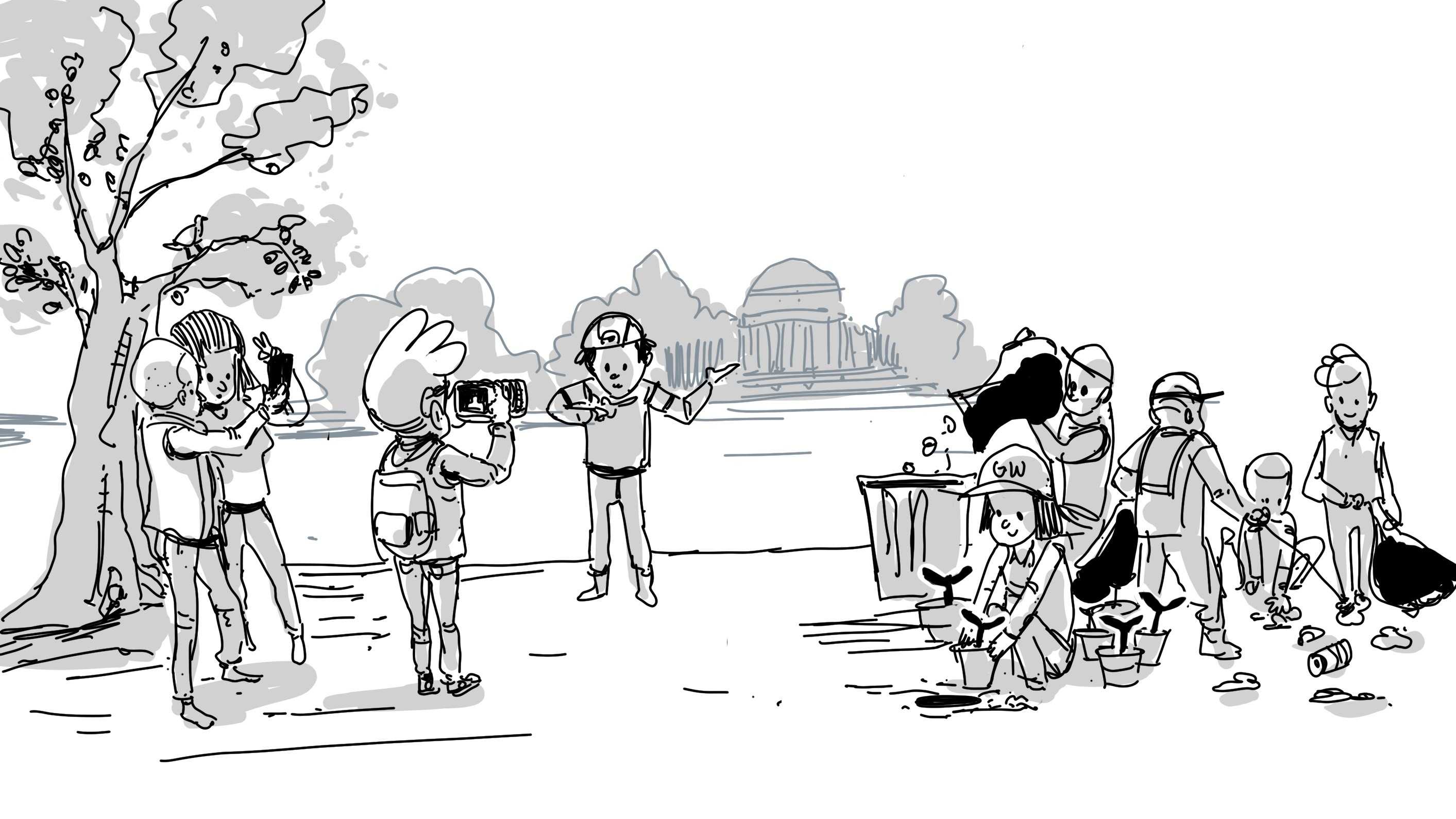This month, I did something I rarely take the time to do: volunteer. I’d love to say that I volunteer regularly, but the reality is that the last time I left campus to give back to the D.C. community was back in October at Freshman Day of Service. I enjoyed the day spent removing weeds at the Fort Dupont ice rink, but I was shocked to see my roommate, suitemates and other people who lived on my floor skip out on the event. Since then I’ve relied on a busy class schedule and philanthropy that I do with my sorority to explain my lack of service – but I know those are flimsy excuses.
Many students find themselves collecting the same excuses, and some avoid service through graduation. The University has promoted volunteering before, but they waver on their commitment to service too. When former First Lady Michelle Obama challenged the University to complete 100,000 hours of community service in 2009, students exceeded the goal so she stuck to her promise and spoke at commencement in return. Every year, programs like Freshman Day of Service and MLK Day of Service and Leadership encourage students to be active in the community, but these few days are not enough. The University should require 20 community service hours to put more pressure on students to volunteer in their community, so they gain real world experience outside of classes and see the District beyond Foggy Bottom before they graduate.

Cartoon by Jekko Syquia
Students are fortunate enough to attend college in the nation’s capital so we should take the time to leave D.C. better than when we first found it. Students have time throughout the year to help pick up litter, volunteer at soup kitchens and be leaders for young students across the wards. D.C. has the highest income inequality in the country – higher than all 50 states – which means living in a wealthy ward like where Foggy Bottom is situated is much different than living in other parts of the city. Having the opportunity to live in one of D.C.’s wealthiest wards is a privilege, so students need to get out of Foggy Bottom to see that and give back where they can.
Volunteering isn’t just beneficial to the community – it provides students with the hands-on learning that GW promises potential students. Through service projects, students can see new parts of the city, meet new people and get experience that will help them in future careers.
Programs that require students to give back to the community surrounding their school is fairly common. Syracuse University’s business school, the Whitman School of Management, requires 75 hours of unpaid volunteer work outside of Greek philanthropy events or service-focused clubs. At American University, students who complete 40 hours of community service and an academic assignment from a professor can take one additional class that is graded as pass or fail, which could help boost their GPA. At Emerson College, students must engage in eight hours of community service each semester. Other schools around the country require community service to graduate or offer some sort of incentive for giving back, and GW should too.
While students logged over 700,000 hours of community service at the Honey W. Nashman Center last academic year, I personally know very few people who do any volunteering outside of their student organizations. But, GW makes it easy for students to get involved on their own. GW has a blog that is updated weekly and lists volunteer opportunities that makes finding and applying for opportunities simple. The Columbian College of Arts and Sciences already encourages students to look at the community around them through the local or civic engagement course requirement, and adding a service requirement could give that learning more experiential value.
The University should require students to complete 20 hours of community service during their time at GW in order to graduate. As graduation rolls around, many students who collect their diplomas likely haven’t volunteered since the freshman requirement – but a commitment of 20 hours over four years was likely not out of reach. Students could reach the hours through a student organizations, if an executive board member signs off on their participation, but could also utilize the Nashman Center to sign up for their own opportunities. This doesn’t seem like much to ask, as volunteer opportunities around the District are plentiful, and service hours can be quickly logged at the Nashman Center and used to apply for awards or benefit students on job and internship applications.
Students care about making the world a better place – but a push from the University to get involved would help. I know that I am one of the many students who would have volunteered sooner in my college career with a requirement to motivate me to volunteer after the Freshman Day of Service. GW should follow in the footsteps of other peer schools and commit to the importance of service by requiring students to give back to the community of people just off campus before they graduate.
Rachel Walsh is a freshman and a Hatchet opinions writer.
Want to respond to this piece? Submit a letter to the editor.

